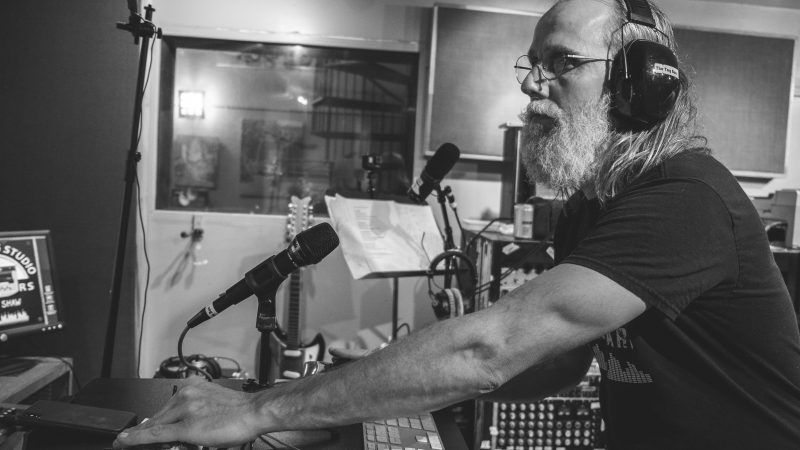The Tennessee Supreme Court Could Decide the Fate of Nashville's Home Recording Studios
The city's restrictions threaten one of the world's most vibrant music scenes.

The Tennessee Supreme Court could soon decide whether home recording studios can keep making music in Music City.
On Wednesday, the court heard oral arguments in a lawsuit challenging Nashville's restrictions on client visits to home-based businesses. The plaintiffs argue that the city's regulations arbitrarily and unfairly deprive them of their right to earn a living.
"I've been doing this for 30 years here, so I've already sunk my entire life's career and family into this," says Lij Shaw, one of two plaintiffs suing Nashville over the rules. "For me and most people I know, we can't stop making music. We're artists, and we love to do this."
Shaw, who Reason profiled in 2019, has been fighting to save his business, The Toy Box Studio, since 2015. That's the year Nashville's code enforcers informed him that the law barred him from recording musicians for pay at his home. Presented with the choice of either shutting down his operation or fighting back, Shaw chose the latter.
In 2017, he and Patricia Raynor—whose home hair salon business was similarly targeted—sued Nashville to overturn its prohibition on client visits.
Their lawsuit argues that neither business has caused any injury to its neighbors by receiving customers at their homes, making Nashville's restriction on client visits arbitrary.
The city, Shaw notes, places no limits on how many people you can invite into your home for free, which allows for much more disruptive activities.
"It would technically be legal to hire the entire symphony orchestra to come to my studio, park all over the neighborhood like a football party, and record all weekend," says Shaw. "But if they paid me $1 for a thank you, it would be illegal."
Shaw and Raynor's complaint also says that Nashville's policy is unfair to their particular businesses, given that the city allows home-based businesses such as short-term rentals to have up to 12 paying customers onsite. This unequal treatment, they argue, violates the Tennessee Constitution.
In 2019, a Davidson County Chancery Court judge ruled against Shaw and Raynor. Because Nashville could articulate potential harms from allowing home-based businesses to serve clients onsite, the judge said, the prohibition was rational and, thus, constitutional.
Home-based businesses received something of a reprieve the following year. In July 2020, Nashville's Metro Council voted to amend its client visit prohibition to allow home businesses like Shaw and Raynor's to service up to six customers onsite per day.
That's an improvement over the status quo, says Keith Diggs, an attorney at the Institute for Justice, a public interest law firm representing Shaw and Raynor. (The Tennessee-based Beacon Center is also working on the case.) But it's still unequal treatment, he notes.
"Pat and Lij can only have six clients a day," Diggs notes, while "day care homes [and] historic home events can have up to 12 more clients a day." The city's ordinance also sunsets in January 2023. It is unclear whether client visits will be flatly prohibited or totally unregulated after the law expires.
An attorney for Nashville told the Tennessee Supreme Court yesterday that while the ordinance is ambiguous, it's her interpretation that there will be no restrictions on client visits once the law expires.
Diggs says that Nashville has taken conflicting stances on what happens after the law sunsets. That ambiguity—and the fact that the city could easily reimpose explicit restrictions on client visits in the future—still makes this a live issue, he says.
During yesterday's hearing, the justices spent most of their time exploring whether Shaw and Raynor's case is moot given that Nashville has lifted its blanket prohibition on client visits and given that the new six-client-a-day limit is set to expire next year.
They could choose to dismiss the case, send it back to a lower court, or rule outright on the merits of Nashville's restrictions.
The hope, says Diggs, is that the state Supreme Court will issue a decision saying that "facts actually matter."
At no point, he says, has Nashville been able to show that Shaw or Raynor's home businesses were negatively impacting their neighbors. Without that, he argues, the city shouldn't be able to impose restrictions on what business owners can do on their own property.
Shaw says a ruling protecting home businesses would add much-needed certainty for his studio, which he has sunk some $50,000 into since Nashville passed its temporary rules allowing client visits. He says it would also help preserve the unique music scene that has made his city famous.
"Music City is still a rare gem in the world where the world's musicians get together face-to-face in front of microphones," he says. "Without the ability to have a musician come to my home studio, I'll be forever stuck in a world of Zoom calls and computer living. I don't want to let the old music die."
